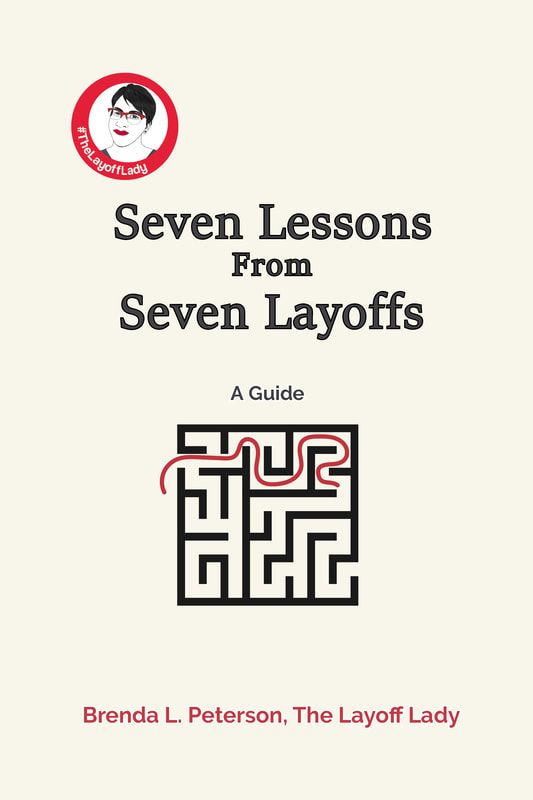|
By Brenda L. Peterson, The Layoff Lady Post-Layoff ChallengesWhen your “day job" ends, many things in your financial life change. For one, what is for many people their primary source of income, ends. This often prompts a quick shift to a short-term survival mindset that will last from the layoff event until the first paycheck from that new job arrives. After you think about your overall survival budget goals and managing expenses, think about your sources of income during your career transition. Disclaimer: (You know there has to be one of these now that we're talking about topics like personal finances and health insurance.) While I know quite a bit based on my previous work experience supporting financial coaches, my own research, and my personal life experiences, I do not currently hold a license or certification to give financial advice. Therefore, the information provided here is educational information provided as guidance. I hope you can glean value from my lessons learned. Feel free to take my recommendations or not—but whatever you do, double-check my facts (and everyone's facts, for that matter). This is your life, and you will care more about your finances and health care than anyone else. With that, read on. Income While WorkingWhen you’re gainfully employed, usually a couple of times per month, you receive your paycheck. Your taxes are deducted according to what you set up. You also typically have deductions for health care costs, company-sponsored insurance benefits (life insurance, disability insurance), and company-sponsored savings (Flexible Spending Accounts, Healthcare Savings Accounts, retirement contributions). Once that company no longer employs you, your income changes significantly. Possible Money From Your Employer After LayoffWhile you won’t have the income from your job on a go-forward basis, you may have one or more of these types of money coming from that employer after your position ends. Your Last PaycheckYou will receive a payment for any hours worked for which you still need to be paid. Typically, this check will not include deductions for health insurance or any other benefits since you no longer participate in those programs. In addition, taxes will be withheld from this payment. Remaining Paid Time Off (PTO) or VacationDepending on multiple factors, you may be paid for any PTO you had accrued but had not yet taken. For example, if the company you worked for had “Unlimited” paid time off, you will not receive any vacation payout since there was no tie between accruing and taking time off. In addition, some companies have written into their company policies that they do not pay out vacation time after an employee no longer works there. However, some states require vacation payouts from previous employers. (I know this because Nebraska, my current state of residence, is one of those states.) Know that getting a payout is not guaranteed, but this is definitely something you should investigate to see if you are eligible. A Severance PackageA severance package may be a component of your layoff. Severance could include a lump sum, continuation of insurance for a period of time, and/or support services to help you transition to a new position outside of that organization. In many cases, companies do not have to provide any sort of severance. If they offer severance, it is often to help minimize the likelihood of former employees taking legal action after a layoff. It is also a way that companies help their employees financially during that difficult transition time. If you do receive a severance payment, the amount can vary wildly. It could be between a fat lot of nothing, to the equivalent of a paycheck, to 1-2 weeks of pay for each year you were with the organization, to a larger check equaling months of income. It depends on the organization, their financial position, how they want to be perceived by the media during the layoff, or any other factors. If you receive a severance payment, realize that it may be less money than you anticipated because of withholding taxes. If you are offered a severance package, realize you must sign something before receiving a payment, benefits, or any other services promised. Once you sign, any thoughts you might have about legal action regarding your employment with the organization are pretty much over. Read the agreement given to you, consider having a lawyer look it over, and ask for clarifications (and any revisions) before signing it. After that, there is typically a waiting period before you receive that money. This is big-time adulting here, so enlist help as needed. Unemployment Insurance (UI) BenefitsWhile your regularly scheduled income from your previous employer ends, in most cases, with a layoff, you will be eligible for unemployment insurance (UI) benefits. In short, apply for UI benefits. Remember--this is money that you paid into your state government while you were working. There is no shame in collecting unemployment because it is literally your money that you paid in and get to use for this purpose. UI BasicsHere are a few key details about UI payments:
Additional Factors That Impact UI Benefits PaymentsYou may also be eligible for job search support services and even programs to help you upgrade your skills. In many states, you must complete outlined “reemployment activities” to stay eligible to receive unemployment payments. For example, some states may require you to apply for a given number of jobs each week, or attend classes, or confirm you did not turn down a suitable job offer. Also know that if you will be receiving a severance payment, it will impact when you are eligible to start receiving unemployment payments. When you apply for unemployment, you will be asked to specify any payments you still expect to receive from your previous employer. Typically, if you are receiving severance that is intended to cover a set period of time, you will also not be eligible for unemployment payments during that time. Personally, I had periods when I was in a career transition where I never received an unemployment payment because I started a new job before the number of weeks specified for my severance ran out. Again, if you’re unsure on details, make that phone call to ask for clarification. Interim Paid WorkDepending on your situation, you may need to find interim work while looking for a more permanent role. For example, if the amount you receive from UI benefits needs to be increased to pay your core bills, you may need to take a job to make ends meet. This could be anything from contract work in your chosen field (that may pay pretty close to your previous full-time job) to a supplemental job that you do for a little extra income. If you have a partner, it may be a case where they take on additional paid work or help more with expenses while you are in career transition. Other OptionsThere are multiple ways to pay for your life, varying from good to decidedly bad ideas. You could do anything from using your savings, to selling unused items, to using credit cards, to acquiring additional debt, to using your home equity, to taking money out of your HSA account (and paying taxes on what you removed), to starting a Go Fund Me page, to donating plasma, or even tapping into retirement accounts (and paying a steep penalty). Be sure to consider the short and long-term implications of any of those decisions before choosing your course of action. Learn More
0 Comments
Your comment will be posted after it is approved.
Leave a Reply. |

Just get laid off?
Click here for info on what to do first. Author7-time layoff survivor Brenda L. Peterson, The Layoff Lady, waxes poetic on layoffs, job transitions, & career resilience. Buy The Book!Were you recently laid off from your job and need a roadmap for what's next? Pick up a copy of my book, Seven Lessons From Seven Layoffs: A Guide!
Categories
All
Archives
July 2024
|




